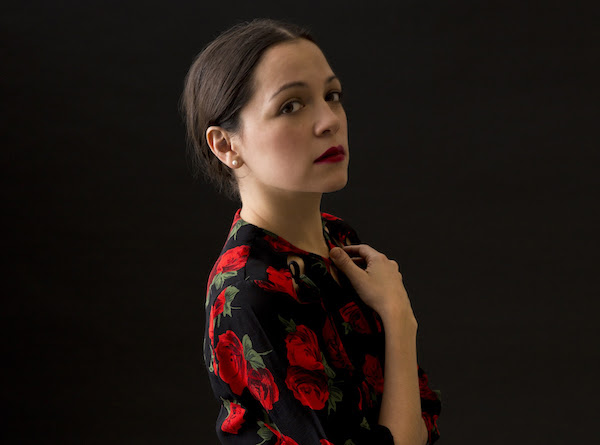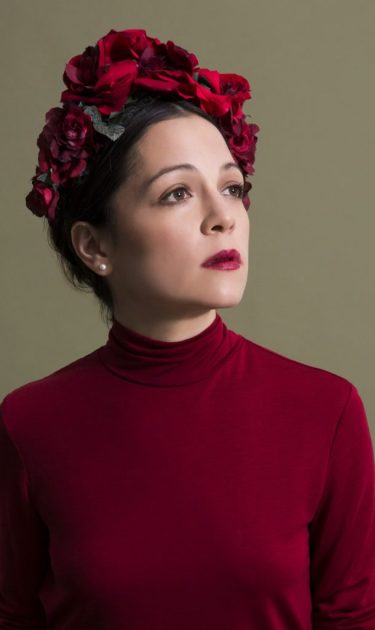If there’s one thing that ties Natalia Lafourcade’s discography together, it’s her willingness to connect. No matter how different each one of her creative phases is, there’s a longing to relate to something greater: her audience, songwriters of the past who have inspired her, or melody itself. On Musas, all of these sources of influence converge into a single vision.
In many ways, Musas is a new turn for Lafourcade and the culmination of years of music making. She wrote her sixth studio album while she was still touring her previous effort, the sophisticated pop opus Hasta La Raíz, which saw her following her own path, earning big accolades and garnering commercial success in the process. Working at full speed, Musas became a sprawling work. It feels intimate and organic, and also serves as a mini lesson in Latin American music, since she covers songs from the likes of Violeta Parra, Roberto Cantoral and her beloved Agustín Lara, as well as features from legends like Cuba’s Omara Portuondo and Los Macorinos, Chavela Vargas’ frequent collaborators.
Lafourcade has made a career out of her search for new sounds to adorn her melodies. In each of her efforts, she demonstrates a deep love for melody in all its forms, exploring it every way she can, and garnering a huge following in the Spanish-speaking world. Throughout the years, she has evolved into one of Mexico’s best songwriters and singers, thanks to her deep knowledge of music history and her ability to craft picturesque songs.
We spoke on the phone with Lafourcade to talk about her new album, patience, humanity, and creative inspiration.
The record is inspired by the Latin American songbook. What motivated you to make this record?
There were many factors behind it. One is that I really wanted to work on music at home, in a Bohemian way. I wanted a project that would allow me to connect with traditional folk music, especially Latin American folk and the songwriters I admire, kind of what I did with Agustín Lara [2012’s Mujer Divina] but in a new way. I also really wanted to work with Los Macorinos; that was something I had in mind for a long time.
I wanted a warm record that sounded like wood, with acoustic instruments to connect at a deeper, more spiritual level. Little by little, things started rolling. The songs started coming together, because music tends to have its own force and personality and give you hints of where you should take it.

What made you want to tackle such a project?
I wasn’t thinking of it in terms of a record; I saw it more as a way to please myself. The music that I wanted to make is the music that I like listening to at home. I wanted to get closer to the spirit of the songs, to simplify [the songwriting].
What was your criteria for choosing which songs to tackle? I imagine it was very difficult to choose which songs by which artists to cover.
“Qué He Sacado Con Quererte” – it’s a song by Violeta Parra that I have known for a long time. Sometimes people approach covers albums by selecting the most popular songs. What I was looking for was to bring forth songs that my audience might not know as well. We also did a version of “Te Vi Pasar” by Agustín Lara, but we did it as a sort of polka-gypsy-norteño – I gave it my own style.
You told me you wanted to collaborate with Los Macorinos, but what was it like to finally have them in the studio with you? You also have a duet with Omara Portuondo. How was that experience?
I have collaborated with so many awesome people, but then I had this idea of making every collaboration much more deep and focused. They have to bring something new to me. In this case, it was a completely new experience to have Los Macorinos with me in the studio. We reached a whole new level because it wasn’t a very comfortable choice to work with them. How was I to play with these gentlemen? They have so much more experience.
“Many people in Mexico and Latin America have overlooked the cultural wealth we have.”
The collaboration with Omara Portuondo was a very beautiful thing. I wanted a female voice because the record is an homage to my muses. It is a very feminine record; it’s present in the songs of Violeta Parra, Toña La Negra, and Chavela Vargas. I wanted to have the presence of all these women. I wanted the voice of a very powerful woman on that song. I was not expecting Omara Portuondo to agree to be on my record – we’re talking about a very old woman (she’s in her 80s) and she had to come from Cuba to Mexico City. It was a long shot, but we got her on the record.
Did you work together in the studio?
We recorded all the tracks live; that was a very interesting part of the project. I didn’t want to do overdubs afterwards, and frankly, we had a great time. It was a dream come true, another one of so many.
Do you think this is something you would like to revisit some time in the future?
We’re doing Musas Vol. 2. It’s an extension of the first one with different songs; we just finished it. They both complement each other quite beautifully. I had a very ambitious approach to this project, but I was not expecting to release a record immediately. But we needed to make the record fast, because Los Macorinos are old people. It’s a tough thing to say, but I didn’t want them to pass away before we could have a chance to make the record.
After making the record, did you have a revelation about yourself?
It’s a record that gave us big lessons. I learned about patience and humanity while working with Los Macorinos; if I could sum it up it in one word it would be “humanity.” There’s even a song called that on Vol. 2. It was very immersive teamwork – to learn to collaborate with others, to learn each other’s rhythms. You come across these guys who have learned the importance of patience in this life, and it allows them to have a chance to connect to the music in a different way – with the musical experience, the people, the conversations. I feel that’s the spirit of this album.
Musas has many connections to Mexico and Latin America. Did the political climate in Europe and the U.S. have anything to do with the inspiration, looking South when other places have become intolerant of immigrants?
I think everything that has happened is horrible, politically and socially speaking. I think it’s going backwards, instead of evolving. Many people in Mexico and Latin America have overlooked the cultural wealth we have. We have a lot of strength, enough to pay no mind to this social nonsense and concentrate on what we really have. I didn’t do the project thinking this, though. I wanted to gift something beautiful to my people, my fans.
Natalia Lafourcade’s new album Musas is out now on Sony Music Latin. See her on tour in the U.S. this year:




